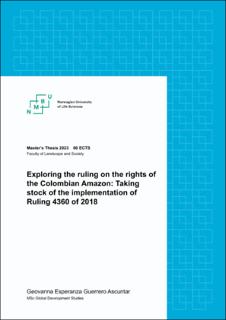| dc.description.abstract | This thesis examines the Colombian ruling STC 4360-2018 on the Amazon region, assessing its implementation status and challenges amid Colombia’s current socio-political landscape. The ruling seeks to combat climate change by curbing deforestation to safeguard future generations’ rights. Furthermore, the ruling declares the Colombian Amazon as an entity subject of rights aiming to protect this crucial ecosystem. Nonetheless, the ruling’s practical impact remains uncertain even after five years after its issuance. The conservation of the Amazon is crucial for Colombia and the global environment, as it is often referred to as the “lungs of the world.” Despite various initiatives and commitments, including the Paris Agreement, deforestation remains a significant issue in the Colombian Amazon region.
To meet the overall objective of exploring the concrete impacts and challenges to the Amazon ruling implementation, I conducted a qualitative case study using inductive and deductive analysis to explore the relationship between theory and empirical data. I collected primary data by performing semi-structured interviews with people involved and engaged with the ruling process. Additionally, I reviewed relevant official documents, academic literature, and grey literature. To support my discussion, I interplayed the findings with the pluriverse and ecological justice theories acknowledging that these theories align with the rights of nature concept and could be an alternative to include nature’s rights into legal frames.
Based on the evidence, I argue that the actual execution of conferring rights to natural entities, exemplified by the Amazon ruling’s case, remains relatively undefined within the legal structure because of multiple challenges. These challenges are related to institutional and cultural disarticulation, disconnection between the ruling’s conceptual framework and its applicability on the ground, a top-down approach in its process, and the country's complex dynamics, such as armed conflict, peace efforts, and illegal activities. Furthermore, I suggest that the rights of nature lack support for necessary shifts towards inclusive politics that encompass diverse worldviews and seek achievable environmental protection.
This thesis contributes to ongoing rights of nature and environmental protection discussions, highlighting complexities in translating legal frameworks into actual transformations. | |
